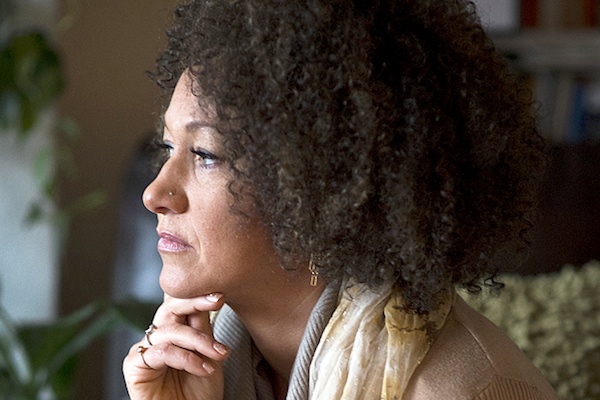Rachel Dolezal seems to think so
Washington-state resident Rachel Dolezal has made her living and life for the past several years as a scholar, artist, and activist.
Dolezal has been a leader in college campus and community development through volunteerism and research, coordinating MLK day celebrations, teach African American history, holding one woman art shows, and tutoring children, among other activities.
Over the years of being a civic leader, artist, and teacher, Dolezal presented herself as a Black woman.
The problem is Rachel Dolezal has not always been a Black woman. Recently, her parents have come forward, exposing her life as a lie. Dolezal’s exposé begs the question, can one become Black?
The Life and Times of Rachel Dolezal
Rachel Anne Dolezal was born on November 12, 1977 in Lincoln County, Montana. Her parents are listed as Ruthanne and Lawrence Dolezal, and both of them identify as white. Contemporary logic would lead one to believe that their child, who is not adopted, is also white. However, Rachel Dolezal identifies as Black, and even disputes whether or not her parents are her biological parents.
Dolezal claims that her identification with Blackness started early on in her childhood. She told Matt Lauer on the Today Show: “I was drawing self-portraits with the brown crayon instead of the peach crayon and black, curly, hair, you know, yeah. That was how I was portraying myself.”
CNN reports that Dolezal felt that “her path has been made harder from having been ‘socially conditioned (to) be limited to whatever biological identity was thrust upon me.’”
‘I felt very isolated with my identity virtually my entire life, that nobody really got it and that I really didn’t have the personal agency to express it…I kind of imagined that maybe at some point (I’d have to) own it publicly and discuss this kind of complexity. (But) I wasn’t expecting it to be thrust upon me right now.’”
However, despite the sincere affinity Dolezal claims to have with Black culture, the reactions to her life have varied from amusement, to acceptance, to disbelief, to disgust.
Dolezal has even been accused of a sort of blackface performance, an accusation she takes issue with: “I have a huge issue with blackface. This is not some freak, Birth of a Nation mockery blackface performance. This is on a very real connected level, how I’ve actually had to go there with the experience, not just the visible representation, but with the experience, and the point at which that really solidified was when I got full custody of Izaiah. And he said, ‘you’re my real mom,’ and he’s in high school, and for that to be something that is plausible, I certainly can’t be seen as white and be Izaiah’s mom.”
However, this notion that as a white woman she could not parent a Black child is both curious and untrue. Furthermore, Dolezal also has a reputation for policing other people’s ethnicity and potentially lying about hate crimes while herself being of dubious cultural heritage.
As Chauncey DeVega notes “The central problem in the curious case of Rachel Dolezal is that, as a white person, she could opt in or opt out of ‘blackness’ on a whim and for her own purposes, without suffering the diminished life chances that come with being a black American.”
Rachel Dolezal imagined that in order to create positive social change that she needed to steal blackness for herself. This was not just a profane act of racial tourism, it was also unnecessary.”
Is being “transracial” like being transgender?
Dolezal’s racial identity and what it invites us to consider is very complicated. Up until now, the term transracial has referred to interracial adoption, where the adopted parents are of a different race than their adopted children. In the wake of the Rachel Dolezal scandal, the term has been increasingly bandied about to describe folks who willfully cross the color line because they feel a greater affinity with a race that is not their own.
This notion of being transracial has prompted some to question whether or not it is a category not unlike that of transgender. While some pose this as a way of dismissing transgender identity, others are grappling with the constructedness of both race and gender as social and biological categories.
Kai Green notes in The Feminist Wire “The question many have asked: “If we accept Caitlyn Jenner as transgender, then must we also embrace Rachel Dolezal as ‘transracial’? The response from many POC, Black, queer, transgender, organizers, scholars, theorists and artists has been to end the conversation with ‘Race and gender are separate.’ To ask that question or put the two together in any way becomes transphobic. But the question itself isn’t transphobic. The answer that one arrives at, if you hold on to a historically situated notion of blackness and a presentist (gender is not only socially constructed, but historically naturalized) notion of gender, is transphobic.”
Ultimately, there are perhaps more questions that answers when it comes to what the Rachel Dolezal case invites us to consider about race and gender. While I am prepared to dismiss her behavior as an act of cultural piracy, the ways in which we have discussed her case is potentially very revealing. Put another way, one potentially productive thing it has done is to highlight the poverty of language we have around our understanding of race and call us to get a better handle of how we as a society understand identity and community.
Source: About News/Womens Issues
Featured photo credit: AP/Colin Mulvany

